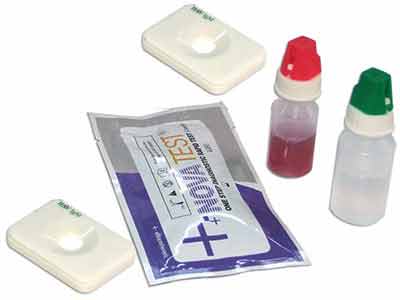dsDNA IgG Dot Filtration Assay Kit
dsDNA IgG Dot Assay kit is a one-step rapid test kit, which is used for the detection of IgG antibody specific to double stranded DNA in human serum.

Intended Use
dsDNA IgG Dot Assay kit is a one-step rapid test kit, which is used for the detection of IgG antibody specific to double stranded DNA (ds-DNA) in human serum, as an important clinical indicator in the diagnosis of the systemic Lupus Erythematosus (SLE) as well as Rheumatoid Arthritis illness.
dsDNA Testing Principle
In this dsDNA IgG rapid test kit, purified ds-DNA antigen is coated on the surface of membrane. During testing, the ds-DNA IgG antibody, if present, will be captured by the dsDNA antigen and be fixed on the membrane. Then after washing away the serum specimen to clear the unbound proteins, the reagent containing antibody to human IgG (anti-IgG) antibody conjugated with colloidal gold particles is added, the bound ds-DNA antibody will capture the anti-IgG-colloidal gold particles. The accumulation of the colloidal gold particle on the testing spot region will show a colored spot, indicating a positive result of dsDNA IgG antibody.
dsDNA and SLE Disease
Antibodies reacting with native double-stranded DNA are regarded as being specific to systemic lupus erythematosus (SLE) and can be detected in approximately 50-80% of the SLE patients. Antibodies against dsDNA are found during active phases of SLE, their serum concentration tend to positively correlate with the severity of the disease. Thus, detection of these autoantibodies is important for the diagnosis and clinical monitoring of the disease and consequently has been established as 1 of the 11 American College of Rheumatology (ACR) criteria for the diagnosis of SLE.
Systemic Lupus Erythematosus (SLE)
The systemic lupus erythematosus (SLE) is a systemic autoimmune disease that can affect any part of the body, including the heart, joints, skin, lungs, blood vessels, liver, kidneys, and nervous system. Under hypersensitivity reaction, the immune system attacks its own body's cells and tissue, resulting in inflammation and tissue damage. The course of the disease is unpredictable. SLE can be treated by addressing its symptoms, mainly with cyclophosphamide, corticosteroids and immune-suppressants; there is currently no cure. SLE can be fatal, although with recent medical advances, fatalities are becoming increasingly rare.

 Atlas Link Technology Co., Ltd
Atlas Link Technology Co., Ltd